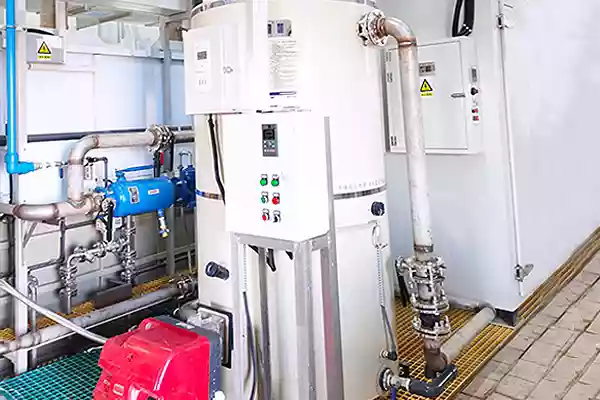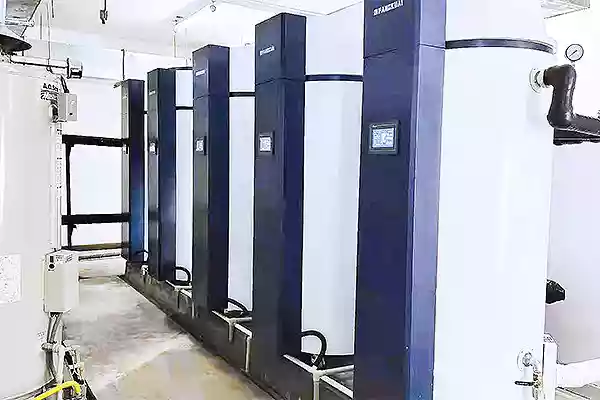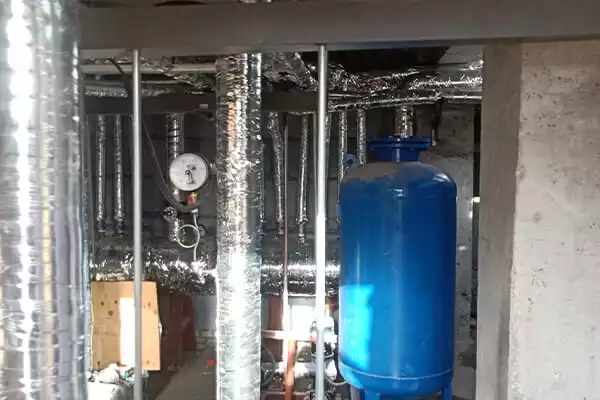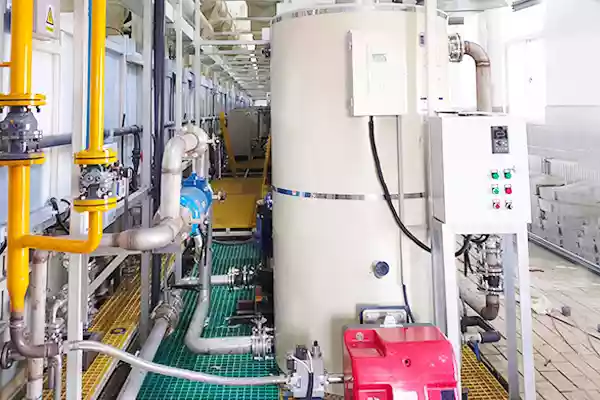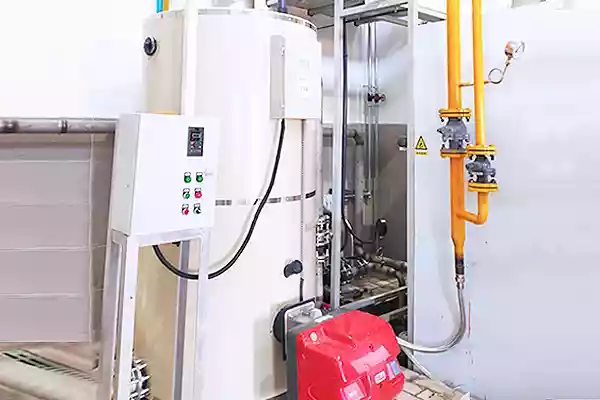
If you need to replace your gas boiler, it’s important that you choose the right replacement system in order to get the most out of your new boiler. In this comprehensive guide, we’ll unravel the mysteries surrounding gas boiler replacement, empowering you to make the right choice for your home.
Is it worth replacing old gas boiler?
Yes, it’s often worth considering replacing an old gas boiler, especially if it’s no longer efficient or if you’re experiencing frequent breakdowns. Older boilers tend to be less energy-efficient, leading to higher utility bills. Upgrading to a newer model can improve your heating system’s efficiency, reduce energy costs, and enhance your home’s comfort.
What will replace gas boilers in 2025?
In the UK, there’s a plan to phase out traditional gas boilers in favor of more environmentally friendly options by 2025. These alternatives may include heat pumps, hydrogen boilers, and other low-carbon heating systems. The exact replacement technology may vary by region and government regulations.
When should I replace my gas boiler?
If you have a problem with your boiler, it is worth getting it checked out. If the problem is minor and can be fixed easily, then no need to replace the whole system. Here are several factors that can help you determine when to replace your gas boiler:
- Age: If your boiler is over 15-20 years old, it’s likely less efficient and may be nearing the end of its lifespan.
- Efficiency: If your boiler has a low-efficiency rating (usually below 90%), you may save money by upgrading to a more efficient model.
- Frequent Repairs: If you’re spending a lot on repairs, it might be more cost-effective to replace the boiler.
- Energy Bills: Rising energy bills could be a sign that your boiler is inefficient and needs replacing.
What can I replace my old gas boiler with?
You can replace your old gas boiler with a variety of different types. If you’re looking for more information on each type, we’ve got you covered!
Oil Boiler
Advantages
Availability: Oil is readily available in many areas, making oil boilers a viable option for homes without natural gas connections.
Efficiency: Modern oil boilers are efficient and can provide consistent heating.
Reliability: Oil boilers are known for their durability and long lifespan when properly maintained.
Disadvantages
Environmental impact: Burning heating oil releases carbon emissions, contributing to environmental concerns.
Fuel costs: Oil prices can fluctuate significantly, potentially leading to higher heating costs.
Maintenance: Oil boilers require regular maintenance, including fuel delivery and tank inspections.
Electric Boiler
Advantages
Efficiency: Electric boilers are highly efficient and convert all the energy into heat.
Compact size: They are compact and can be installed in smaller spaces.
No fuel storage: No need for fuel storage tanks, reducing maintenance.
Disadvantages
Higher operating costs: Electricity tends to be more expensive than gas or oil, resulting in higher heating bills.
Carbon footprint: The environmental impact depends on the source of electricity, which may not always be eco-friendly.
Limited capacity: Electric boilers may not be suitable for larger homes with high heating demands.
Biomass Boiler
Advantages
Renewable fuel: Biomass boilers use sustainable fuels like wood pellets, reducing carbon emissions.
Government incentives: In some regions, there are incentives and subsidies for using renewable energy sources.
Long lifespan: Biomass boilers are robust and have a long lifespan when properly maintained.
Disadvantages
Fuel storage: Storing biomass fuel can require substantial space.
Maintenance: Regular cleaning and maintenance are necessary to prevent issues like ash buildup.
Initial cost: Biomass boilers can have a higher upfront cost compared to traditional gas boilers.
Heat Pump
Advantages
High efficiency: Heat pumps are incredibly efficient and can provide both heating and cooling.
Lower operating costs: They use electricity to move heat rather than generate it, resulting in lower energy bills.
Environmental benefits: Heat pumps produce fewer greenhouse gas emissions compared to combustion-based systems.
Disadvantages
Initial cost: Heat pumps can have a higher upfront cost, including installation.
Climate dependency: Their efficiency can be affected by extreme cold temperatures.
Space requirements: They may require outdoor units and adequate space for installation.
Hybrid Systems
Advantages
Efficiency and reliability: Combining a heat pump with a gas or oil boiler provides both efficiency and backup heat.
Energy savings: These systems automatically switch between the two energy sources to minimize costs.
Environmentally friendly: They offer reduced carbon emissions compared to using only fossil fuels.
Disadvantages
Complexity: Hybrid systems can be more complex and require professional installation and maintenance.
Cost: They may have a higher initial cost due to the combination of technologies.
Space: Depending on the configuration, they may require more space for installation.
When choosing a replacement for your old gas boiler, carefully consider your specific needs, budget, and environmental concerns. Consult with heating professionals who can provide guidance on the best option for your home, ensuring both comfort and efficiency.
How do I choose a replacement boiler?
Choosing a replacement boiler can be a daunting task. There are many factors to consider and you want to make sure that it’s right for your home and budget.
- Size: Ensure the new boiler is appropriately sized for your home’s heating demands.
- Efficiency: Look for a high-efficiency model to save on energy bills.
- Fuel Type: Choose between natural gas, propane, or oil based on your availability and preferences.
- Brand and Model: Research reputable brands and models that are known for reliability.
- Cost: Balance your budget with long-term energy savings.
Gas Boiler Replacement Process Guide.
Now, let’s go into more detail about the gas boiler replacement process.
Assessment
Initial inspection: Begin the process by scheduling an assessment with a certified heating professional or HVAC technician. They will evaluate your existing gas boiler, as well as your home’s heating needs and insulation. This step is crucial in determining the appropriate replacement options.
Heat load calculation: The technician will perform a heat load calculation to determine the size and capacity of the new boiler needed for your home. This calculation takes into account factors like the size of your home, insulation, window quality, and local climate.
Choose a Boiler
Selecting the right model: Based on the assessment, the technician will recommend suitable replacement options. You’ll need to consider factors like the type of fuel (natural gas, propane, oil, etc.), boiler efficiency, brand reputation, and your budget.
Efficiency ratings: Look for boilers with high Annual Fuel Utilization Efficiency (AFUE) ratings, as they indicate better energy efficiency and potential cost savings over time.
Installation
Professional installation: Once you’ve chosen a boiler, schedule the installation with a certified and experienced HVAC technician. Proper installation is critical to ensure the safe and efficient operation of your new boiler.
Piping and venting: The technician will carefully connect the new boiler to your existing piping system and ensure proper venting to expel combustion gases safely.
Controls and safety features: They will set up the boiler’s controls, thermostats, and safety features to ensure optimal performance and safety.
Testing: After installation, the technician will thoroughly test the new boiler. This includes checking for any leaks, ensuring proper ignition, verifying that all safety mechanisms are working correctly, and confirming that the heating system functions as intended.
Maintenance
Regular maintenance: To keep your new gas boiler operating efficiently and extend its lifespan, schedule regular maintenance with a qualified technician. Maintenance tasks may include cleaning, inspection, and component replacement as needed.
Annual Servicing: It’s recommended to have your boiler serviced annually, ideally before the heating season begins, to address any potential issues and ensure it operates safely.
Warranty and Documentation
Warranty registration: Register your new boiler with the manufacturer to activate the warranty. Keep all documentation, including the warranty, installation records, and maintenance receipts, in a safe place for future reference.
Energy Efficiency Considerations
Efficiency improvements: Take advantage of your new boiler’s higher efficiency by optimizing your home’s insulation and sealing any drafts. These measures can further reduce energy consumption and lower heating costs.
Safety Precautions
Carbon nonoxide detectors: Install carbon monoxide detectors near your boiler and in sleeping areas to monitor for potential gas leaks and ensure your safety.
Regular inspections: Periodically inspect the area around the boiler for signs of leaks, corrosion, or other safety hazards. If you notice any issues, contact a professional immediately.
In conclusion, replacing your old gas boiler involves a systematic process that begins with a thorough assessment of your heating needs and ends with professional installation and ongoing maintenance.
What does it cost to replace a gas boiler?
The cost of replacing a gas boiler can vary widely based on factors like boiler type, size, installation complexity, and location. On average, a gas boiler replacement can cost anywhere from $1,500 to $15,000 or more. To get an accurate estimate, consult with local HVAC professionals who can assess your specific needs and provide a detailed quote.
| Type of Replacement System | Cost Range |
|---|---|
| Oil Boiler | $5,000 – $9,000 |
| Electric Boiler | $1,500 – $4,000 |
| Biomass Boiler | $7,000 – $15,000 |
| Heat Pump | $5,000 – $12,000 |
| Hybrid Systems | $7,000 – $15,000 |
Conclusion.
In conclusion, replacing an old gas boiler can lead to improved efficiency, lower energy costs, and enhanced home comfort. Consider your options carefully, and consult with professionals to make an informed decision based on your specific circumstances and heating needs. If you need more information about this process, please reach out to us at 0086 186-2391-5479.
FAQs.
Get your best price
Quickly compare 3 FREE quotes
- Engineer quick quote
- The overall delivery speed is fast
- Financial choice
- Low installation costs and cost savings
25 years+ of boiler R&D
More than 20 innovative technologies
